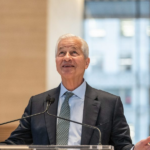China’s consumer prices experienced the sharpest decline in three years, intensifying concerns about deflation and posing challenges to the economic recovery. According to the national statistics bureau, the consumer price index (CPI) fell by 0.5% year-on-year last month, marking the largest drop since November 2020 and surpassing economists’ expectations of a 0.2% decline.
Simultaneously, producer prices registered a 3% decrease, exceeding the forecasted 2.8% fall. Factory-gate costs have now been entrenched in deflationary territory for 14 consecutive months, indicating prolonged economic challenges.
China has grappled with persistent price declines throughout the year, contrasting with efforts by central banks in other regions to combat inflation. Bloomberg Economics predicts that deflationary risks will persist into 2024, as the housing slump continues to dampen demand and prices.

Zhang Zhiwei, Chief Economist at Pinpoint Asset Management Ltd., emphasized the role of weak domestic demand in escalating deflationary pressures and underscored the need for more supportive fiscal policies to address the economic situation.
Deflation poses a significant risk to China, potentially triggering a downward economic spiral. Consumers may delay purchases, anticipating further price drops, leading to a decline in overall consumption. Additionally, businesses might reduce production and investment due to uncertainties about future demand.
Despite the central bank downplaying deflation risks as “temporary,” Bloomberg’s analysis suggests that these pressures persist and warrant a more supportive fiscal stance. To counter these challenges, Beijing has increased its focus on fiscal policy, elevating its budget deficit and encouraging banks to assist local governments in refinancing debt to boost spending capacity.
While Beijing signals a strengthened fiscal support in the coming year, challenges persist, with new home sales dropping significantly and exports remaining weak. The government has sought to stabilize pork prices, a key component of China’s CPI basket, affected by an oversupply of hogs and sluggish consumption.
The core CPI, excluding volatile food and energy costs, saw a 0.6% YoY increase in November, maintaining the previous month’s performance.
As China is poised to miss its annual inflation target of around 3%, the outlook for 2024 remains uncertain. Some economists anticipate modest consumer price growth of around 1%, while others argue that deflation may persist into the first half of the year.
Bruce Pang, Chief Economist for Greater China at Jones Lang LaSalle Inc., emphasizes that proactive fiscal stimulus will play a crucial role in China’s policy objectives in 2024, necessitating a delicate balance between stimulating investment and consumption while mitigating local government debt risks.









